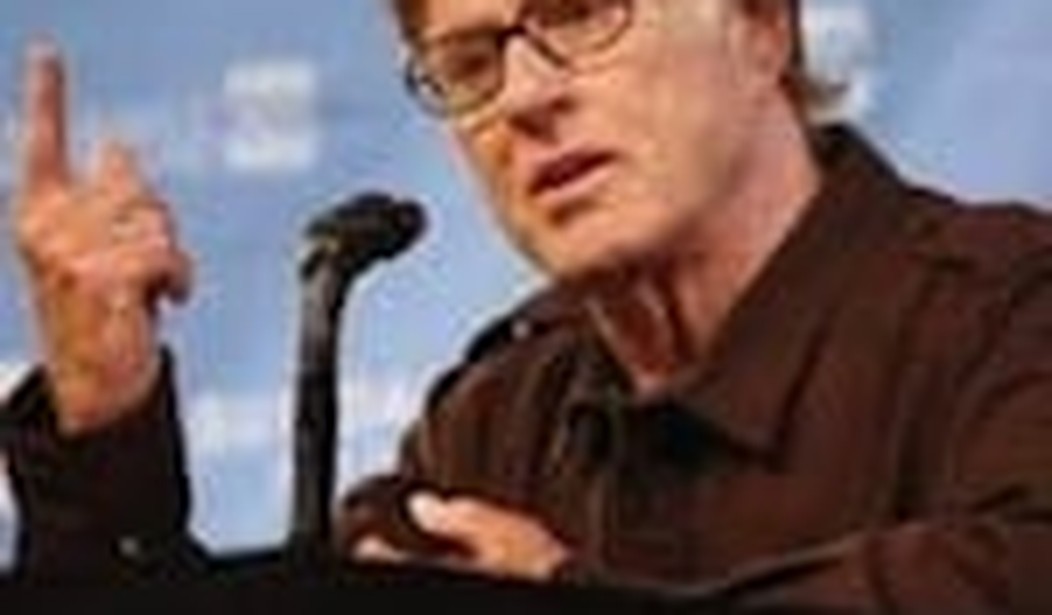The Company You Keep, Robert Redford’s valentine to aging former members of the Weather Underground, opens this week in New York and Los Angeles. I’ve seen it so you don’t have to. Ed Driscoll, Michelle Malkin, Scott Johnson, and Jonathan Tobin have done an excellent job criticizing the politics of the film; this post is intended to provide a consumer alert about its cinematic merits.
The 76-year-old Redford plays a small-town lawyer with an eleven-year-old daughter and an undisclosed past: he was part of the radical group that robbed a bank in the 1970s and killed a guard. He goes on the run after his identity is disclosed by a reporter.
The notable actors, like the characters they portray, have seen better days. They deliver paeans about the way they were, while Redford runs about trying to clear his name (since he may not have been guilty of this particular crime, and further, these days he loves his daughter). In the Sony Pictures Classics press kit, Redford says:
For me [the film] was a bit like Les Misérables, with the character Jean Valjean sentenced to nineteen years for a loaf of bread.
The movie is not a bit like Les Misérables. It might be a bit like Les Misérables if Jean Valjean had been wanted for murder rather than bread-theft. Or had Valjean looked like Robert Redford on a good day, rather than Hugh Jackman after serving on a slave ship and spending two decades in jail; and if Valjean had ultimately been protected by a “conscience-stricken” reporter who decided to toss his further story after Redford lectures him about the importance of keeping secrets:
Secrets are dangerous things, Ben. We all think we want to know them. But if you’ve ever kept one yourself then you understand to do so is not just knowing something about someone else, it’s discovering something about yourself.
Such a message Inspector Javert would probably have found a bit unconvincing had it come from Jean Valjean. Similarly, a journalist would probably find it a bit presumptuous coming from someone who is a fugitive rather than just a source. The rest of us would consider it extraordinarily trite, even if delivered by Redford as if it were literature.
In an unintentionally funny scene, Redford shows up at a Midwestern university to search for a former Weather comrade who is now a respected history professor: the professor may know where Redford can find Julie Christie’s character. Redford sits in the back of the class in his disguise (consisting of a baseball cap pulled low over his forehead, so he won’t stand out as an old man in a college class who looks like Robert Redford).
He watches as the professor regales the class with the insights of … Karl Marx.
The professor is shocked to see Redford — he might blow the professor’s own disguise! The scene is played without any sense of awareness that colleges are the safe houses for most old leftists, hiding in plain sight while mis-educating their debt-burdened students (who pay their salaries) about the evils of capitalism. Heck, you can even have killed two police officers and a Brink’s guard during a robbery and get a job as a professor teaching “restorative justice” at Columbia.
Redford and Christie make an unconvincing duo, an elderly Butch Cassidy and Sundance Kid of the Left, holed up in a mountain cabin while pursued by the police — except in this version they end the movie with a whimper rather than a bang. Christie — after she refuses to help Redford and flees the scene — is shown alone in a boat on a vast empty lake (she’s totally “at sea,” get it?). After an interminable focus on the boat, it starts to turn around: she’s going to return to save Redford. Who could have seen that coming?
Meanwhile, Redford gets caught when he inexplicably runs from one part of the woods to another across a thousand yards of open space at the precise moment a police helicopter flies overhead. Redford’s running form is reminiscent of George Clooney in The Descendants — also funny, but this time unintentional.
The investigating reporter discovers a secret beyond Redford’s identity, and the characters suggest that the highest form of journalism hides what it finds for the right people. When Redford played Bob Woodward there was a different message: fitting, as these days Woodward is persona non grata on the Left.
Times change, presidents change, and apparently media integrity must adjust accordingly.









Join the conversation as a VIP Member